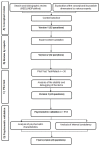Design and Validation of a Scale of Knowledge of Cardiovascular Risk Factors and Lifestyle after Coronary Event
- PMID: 35628900
- PMCID: PMC9147543
- DOI: 10.3390/jcm11102773
Design and Validation of a Scale of Knowledge of Cardiovascular Risk Factors and Lifestyle after Coronary Event
Abstract
Background: It is important for health professionals to have tools available to assess patients' knowledge of lifestyle and cardiovascular risk factors after they have suffered a coronary event and determine whether educational interventions are effective. This study aims to design and validate a scale to evaluate this knowledge.
Methods: Four-phase instrument design: (A) Conceptual review. (B) Review by experts. (C) Pilot test-retest. (D) Psychometric validation of the final version of the questionnaire with 24 items. A panel of experts performed the content validity. The reliability of the scale was measured using Cronbach's alpha score and criterion validity was evaluated by comparing the total scores for knowledge obtained by the participants among the three education level groups. The construct and dimensional structure validity were assessed using exploratory factor analysis.
Results: A total of 143 people participated, 30 in the pilot study and 113 (68% male, 60.2 ± 9 years) in the psychometric validation of version 3 of the scale. A Cronbach's alpha score of 0.887 was reached for this version. The factor analysis showed that the items were distributed into five factors that explained 57% of the variance. Significant differences were observed in the level of knowledge among the patients of the three levels of education (low, moderate and high) (99.20 ± 11.93, 105.92 ± 7.85, 109.78 ± 8.76 points, p = 0.003), as there was a negative correlation between age and knowledge level (r = -0.213, p = 0.024).
Conclusions: The scale presents psychometric properties that are evidence of its reliability and validity. The relationship demonstrated between the level of knowledge and age, sex and level of education shows the importance of emphasizing educational interventions for elderly people and those with a lower level of education.
Keywords: cardiovascular risk factors; coronary disease; knowledge; lifestyle; scale.
Conflict of interest statement
The authors declare no conflict of interest.
Figures


Similar articles
-
Translate and psychometric evaluation of the scale of knowledge of cardiovascular risk factors and lifestyle after coronary event.BMC Cardiovasc Disord. 2025 May 22;25(1):391. doi: 10.1186/s12872-025-04819-0. BMC Cardiovasc Disord. 2025. PMID: 40399784 Free PMC article.
-
Validation of the Chinese Version of the Coronary Artery Disease Education Questionnaire - Short Version: A Tool to Evaluate Knowledge of Cardiac Rehabilitation Components.Glob Heart. 2021 Feb 24;16(1):17. doi: 10.5334/gh.912. Glob Heart. 2021. PMID: 33833941 Free PMC article.
-
Development and psychometric validation of the second version of the Coronary Artery Disease Education Questionnaire (CADE-Q II).Patient Educ Couns. 2015 Mar;98(3):378-83. doi: 10.1016/j.pec.2014.11.019. Epub 2014 Nov 27. Patient Educ Couns. 2015. PMID: 25481574
-
Vietnamese version of the coronary artery disease education questionnaire-Short version: Translation, adaptation and validation.J Clin Pharm Ther. 2020 Aug;45(4):691-697. doi: 10.1111/jcpt.13145. Epub 2020 Apr 30. J Clin Pharm Ther. 2020. PMID: 32356381
-
[Psychometric characteristics of questionnaires designed to assess the knowledge, perceptions and practices of health care professionals with regards to alcoholic patients].Encephale. 2004 Sep-Oct;30(5):437-46. doi: 10.1016/s0013-7006(04)95458-9. Encephale. 2004. PMID: 15627048 Review. French.
Cited by
-
Impact of mHealth application on adherence to cardiac rehabilitation guidelines after a coronary event: Randomised controlled clinical trial protocol.Digit Health. 2024 Mar 19;10:20552076241234474. doi: 10.1177/20552076241234474. eCollection 2024 Jan-Dec. Digit Health. 2024. PMID: 38510574 Free PMC article.
-
Effectiveness of an Interactive mHealth App (EVITE) in Improving Lifestyle After a Coronary Event: Randomized Controlled Trial.JMIR Mhealth Uhealth. 2024 Apr 22;12:e48756. doi: 10.2196/48756. JMIR Mhealth Uhealth. 2024. PMID: 38648103 Free PMC article. Clinical Trial.
-
Translate and psychometric evaluation of the scale of knowledge of cardiovascular risk factors and lifestyle after coronary event.BMC Cardiovasc Disord. 2025 May 22;25(1):391. doi: 10.1186/s12872-025-04819-0. BMC Cardiovasc Disord. 2025. PMID: 40399784 Free PMC article.
-
Efficacy of a Mobile Health App (eMOTIVA) Regarding Compliance With Cardiac Rehabilitation Guidelines in Patients With Coronary Artery Disease: Randomized Controlled Clinical Trial.JMIR Mhealth Uhealth. 2024 Jul 25;12:e55421. doi: 10.2196/55421. JMIR Mhealth Uhealth. 2024. PMID: 39052330 Free PMC article. Clinical Trial.
References
-
- World Health Organization The Top 10 Causes of Death. Fact Sheets [Internet] 2020. [(accessed on 18 October 2021)]. Available online: https://www.who.int/news-room/fact-sheets/detail/the-top-10-causes-of-death.
-
- Kotseva K., De Backer G., De Bacquer D., Rydén L., Hoes A., Grobbee D., Maggioni A.P., Marques-Vidal P., Jennings C., Abreu A., et al. Primary prevention efforts are poorly developed in people at high cardiovascular risk: A report from the European Society of Cardiology EURObservational Research Programme EUROASPIRE V survey in 16 European countries. Eur. J. Prev. Cardiol. 2020;28:370–379. doi: 10.1177/2047487320908698. - DOI - PubMed
-
- Visseren F.L., Mach F., Smulders Y.M., Carballo D., Koskinas K.C., Bäck M., Benetos A., Biffi A., Boavida J.-M., Capodanno D., et al. 2021 ESC Guidelines on cardiovascular disease prevention in clinical practice: Developed by the Task Force for cardiovascular disease prevention in clinical practice with representatives of the European Society of Cardiology and 12 medical societies with the special contribution of the European Association of Preventive Cardiology (EAPC) Eur. Heart J. 2022;75:429. doi: 10.1016/j.rec.2022.04.003. - DOI - PubMed

